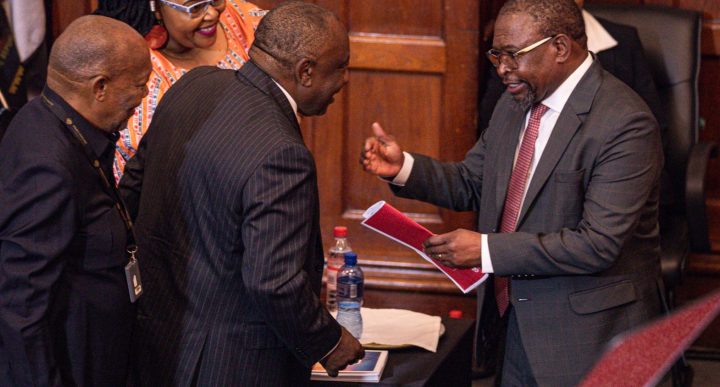GLOBAL ECONOMICS OP-ED
The temporary balm of a Budget that looks good on paper

In an action-packed week, the good news outweighed the bad and financial markets largely discounted a deterioration in geopolitical relations, instead focusing on the well-received South African Budget and poring over US Fed meeting minutes for signs of interest rate certainty.
With so much bad news around, it’s no surprise that we relish what little good, or not-so-bad, news comes around — and so it was this week when two economic events on different sides of the world, which threatened to sow panic in financial markets, instead delivered relatively sanguine news.
In South Africa, it was the Budget, and in the US, it was the Fed minutes, with a time difference of seven hours, which had investors on tenterhooks and selling off in the build-up to these events.
However, financial markets came through both events relatively unscathed and untouched, notwithstanding the accompanying escalation in geopolitical threats when US President Joe Biden and Russian President Vladimir Putin gave confrontational speeches within hours of each other.
Instead, global investors focused on the risk of much higher-for-longer interest rates in the wake of several sets of bumper economic data for January. At home, the Budget was well received because it delivered close to what was expected on the Eskom debt relief front and painted a rosier than what is realistic picture of revenue flows and expenditure reductions in the medium term.
In South Africa, investors unwound their pre-Budget scepticism, leaving the rand still deep in the red for the year so far and government bond yields slightly stronger. The domestic currency sold off at R18.40 to the dollar before the Budget — its worst level this year — before strengthening to R18.29 after the minister of finance’s Budget speech.
But the risk of Stage 8 load shedding and the National Treasury’s sharp downward revision in its growth outlook loomed large and served as stark reminders of the massive challenges South Africa still faces in the years ahead — and the rand weakened back to its pre-Budget lows by the following day.
Meanwhile, in the wake of the release of the Fed monetary policy minutes, stock markets were little changed by the end of the trading day after a 2%-plus sell-off in the main indices the previous day. US 10-year Treasuries gained ground after toying with the 4% level before the release of the minutes when they had all but reversed all the gains made in the year to date.
Looking beyond the short-term complexity of financial markets, what are the longer-term consequences of these cross-continental events? From a medium to long-term perspective, the Budget was seen as confirmation of the government’s continued commitment to fiscal sustainability even though the government’s debt trajectory is higher because of the Eskom debt relief measures.
Visit Daily Maverick’s home page for more news, analysis and investigations
However, causes for concern were that the National Treasury’s estimates for expenditure and revenue collections, which paint a reassuring fiscal picture at face value, could well prove overly optimistic and subject to upside and downside risk, respectively.
Several economists cannot see how the government will achieve its expenditure targets, particularly the unrealistically low increases in public sector wages factored into the numbers. Oxford Economics Africa senior economist Jee-A van der Linde considers it unlikely that the government will be able to stick to its expenditure targets and Sanlam Investments economist Arthur Kamp agrees the wage bill is a particular risk.
Van der Linde says: “Unaffordable wage demands by public sector workers, rising borrowing costs, and a growing need for social support are some of the key factors that underpin our assumptions of higher expenditure growth over the coming years. Consequently, we believe South Africa’s budget deficit will remain wide over the medium term.”
Kamp is also sceptical of whether the government will achieve its envisaged fiscal objectives over the next few years. “Upside risks to spending, the opaque outlook for GDP growth and potential additional bailouts for ailing state-owned companies imply that the jury is still out on the projection of debt stabilisation over the medium term.”
Potentially unrealistic revenue projections would also put the government’s medium-term ambition of achieving fiscal sustainability at risk. Van der Linde questions the Treasury’s optimism about notching up future revenue overruns based on still high commodity prices, arguing, “South Africa’s intense power outages and softer global growth pose notable downside risk to this outlook.”
Global economic developments over the past three weeks make softer global growth even more likely this year. US data that pointed to a surprisingly strong labour market, higher-than-expected inflation and bumper retail sales painted a completely different picture of the US economy compared to three weeks before. When the US Fed raised interest rates by 25 basis points at the end of January, economic data pointed to a softening labour market, inflation coming down and consumer demand waning.
At that point, investors were still banking on rates declining into the end of the year. But the recent buoyant economic data have put paid to these hopes for now and the general expectation is that rates will remain higher for longer.
There are some questions about whether the January US economic data reflect seasonal trends and not a material change in the economy’s trajectory. But given that the Fed’s decisions are explicitly data-dependent, we can expect the Fed’s hawkishness and private sector interest rate outlooks to wax and wane based on the latest datasets — and financial markets to respond accordingly. DM/BM




















 Become an Insider
Become an Insider
“ Temporary” is the perfect word to describe this latest Budget!
In my opinion,this is the calm before the storm.